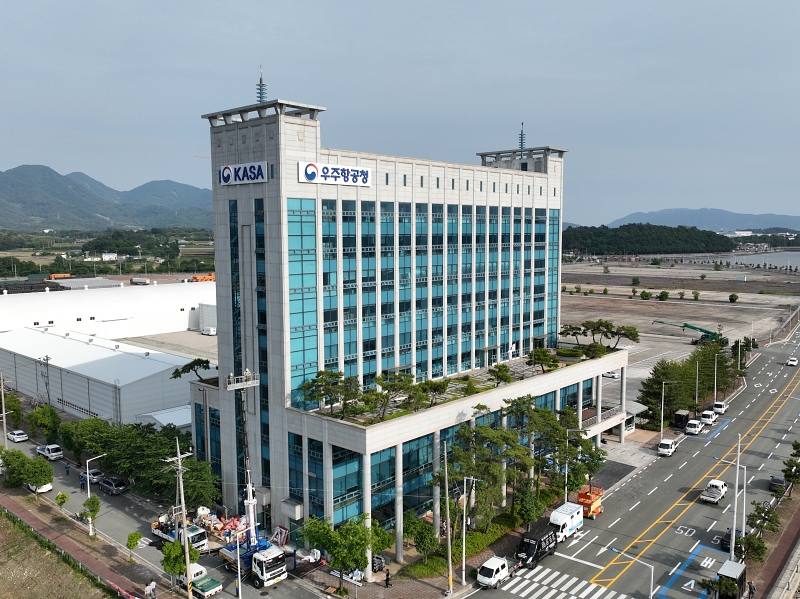
2045년 세계 5대 우주강국 도약을 위한 ‘우주항공청(우주청)’이 경남 사천에서 27일 공식 출범했다. The Korea AeroSpace Administration (KASA), part of an initiative to make the nation one of the world’s top five space powers by 2045, was officially launched on May 27 in Sacheon, Gyeongsangnam-do Province.
우주청은 개청과 함께 한국 우주항공 분야의 정책과 연구개발, 산업 육성 및 국제 협력 등을 총괄하는 ‘컨트롤타워’ 역할을 수행하게 된다. KASA will serve as a “control tower” for the domestic aerospace industry by overseeing policy, research and development (R&D), sector advancement and international cooperation.
정부는 우주청을 통해 창의적인 아이디어와 기술력을 바탕으로 국가 경제를 이끌 혁신 우주항공 기업을 2000개 이상 육성하고 약 50만 개에 달하는 양질의 일자리를 창출할 계획이다.
The government seeks to develop more than 2,000 innovative aerospace companies to lead the economy based on creative ideas and technological capacity and create some 500,000 high-quality jobs via KASA.
이어 우주 분야 전문기업을 적극 지원하고 우주항공산업을 차세대 주력산업으로 육성해 현재 1% 수준인 세계 우주항공시장 점유율을 2045년까지 10%(420조 원 규모)로 끌어올린다.
Other tasks are to support space companies and foster aerospace as a next-generation flagship industry to raise Korea’s share of the global aerospace market from 1% to 10% worth KRW 420 trillion by 2045.
정부는 올해 주요 임무로 우주탐사, 우주수송, 우주산업, 우주안보, 우주과학 등 5대 임무를 설정하고 9923억원의 예산을 투입하기로 했다. The government’s five major missions in the field this year are space exploration, transportation, industry, security and science with an allocated budget of KRW 992.3 billion.
이를 통해 2032년 달 착륙을 위한 달 착륙선 개발에 착수하고 상용 발사 서비스 시장 진입을 위해 차세대발사체 100톤급 다단연소사이클 엔진·설계·개발을 본격 추진한다. 내년으로 예정된 누리호 4차 발사를 위한 체계 총조립과 함께 민간 발사체의 발사 지원을 위한 나로우주센터 내 국내 최초 민간 소형 발사체 발사장도 구축한다.
KASA will develop a lunar probe to land on the moon in 2032 and promote the design and R&D of a 100-ton-class, multi-stage combustion cycle engine for next-generation launch vehicles to compete on the commercial launch service market.
In addition to overall assembly of the system for the fourth launch of the space rocket Nuri next year, the nation’s first private launch site for small projectiles will be built at the Naro Space Center in Goheung-gun County, Jeollanam-do Province, to support private space activity.
미국의 유인 달 착륙 임무인 ‘아르테미스 계획’ 참여 확대 추진, 민간 주도의 우주산업 육성을 위한 ‘우주산업 클러스터’ 3각체제 구축과 태양코로나그래프 발사 등도 예정됐다.
Other plans are expanding participation in the U.S.-led Artemis program for a manned lunar landing, launching a tripartite system for a public-private space industry cluster to lead the private-led space industry and setting up a solar coronagraph.
특히 개청 직후 미국 항공우주국(NASA), 일본 우주항공연구개발기구(JAXA) 등 선도국 우주 연구기관과 국제협력 사업을 즉시 착수할 수 있도록 공동프로젝트를 발굴한다. 아랍에미리트연합국(UAE) 등 최근 우주항공 분야 양해각서(MOU) 체결 국가를 중심으로 하는 경제협력 사업도 적극 추진한다.
Immediately after its opening, KASA went to work on finding joint international projects with leading space organizations abroad such as NASA of the U.S. and the Japan Aerospace Exploration Agency international cooperation. Other economic cooperation projects will target countries that recently signed with Korea memorandums of understanding in aerospace such as the United Arab Emirates.
한편, 지난 2022년 11월 정부는 우주경제 실현을 전담할 우주항공청 설립을 위해 우주항공청설립추진단을 설치했다. 이어 지난해 4월 발의한 ‘우주항공청의 설치 및 운영에 관한 특별법’이 올해 1월 국회 본회의에서 통과됐다.
In November 2022, the government launched a task force to create KASA to build the space economy. In January this year, the National Assembly in a plenary session passed a bill proposed in April last year on the agency’s inception and operation.
박혜리 기자 hrhr@korea.kr
By Park Hyeri, hrhr@korea.kr
